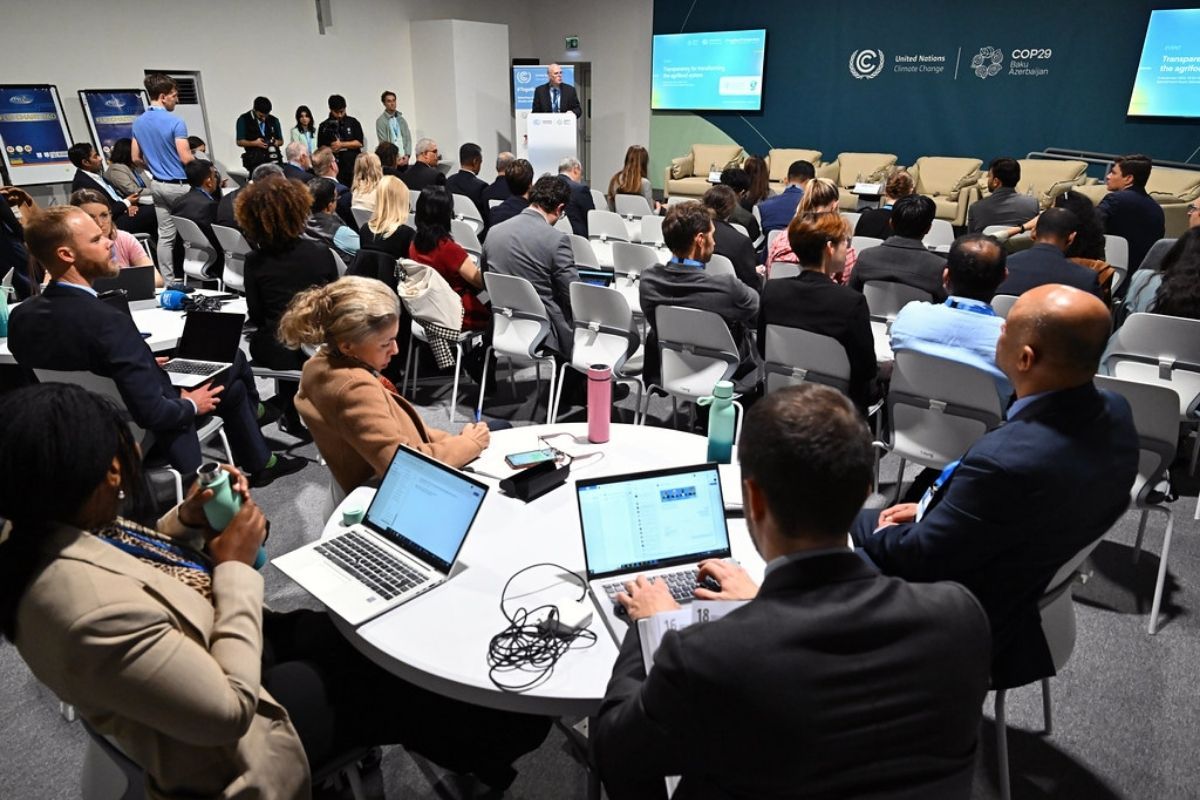At a COP29 press conference in Baku, Brazilian Vice President Geraldo Alckmin, representing President Luiz Inácio Lula da Silva, presented Brazil’s new national climate plan to the United Nations Framework Convention on Climate Change (UNFCCC). The 44-page document details strategies to achieve Brazil’s goal of reducing emissions by 59% to 67% by 2035. The plan outlines Brazil’s commitment to transitioning from fossil fuels, boosting renewable energy, and enhancing adaptation measures. However, analysts called for more transparency and specific timelines to bolster the plan’s credibility and ambition.
Brazil announces ambitious climate plan
Analysts praised Brazil’s timely submission of its revised Nationally Determined Contribution (NDC), marking the second third-generation NDC submitted globally, following the UAE. The new plan highlights key policy areas, including prioritizing adaptation measures, zero deforestation, and large-scale restoration of native vegetation. For the first time, Brazil has included adaptation as a core component of its NDC, signaling a broader focus on mitigating climate change impacts alongside reducing emissions.
Brazil’s NDC reflects its commitment to the COP28 agreements, outlining efforts to phase out fossil fuels, triple renewable energy capacity, and double energy efficiency. The plan includes a pledge to trade emissions reductions with other countries under Article 6 of the Paris Agreement, marking a significant step in Brazil’s climate diplomacy. However, the NDC lacks specific targets and timelines, raising concerns about its long-term effectiveness.
While Brazil’s ambitious targets are well received, the lack of detailed measures and timelines has raised red flags among analysts. A Talanoa Institute, an independent Brazilian think tank report, highlighted that Brazil’s plan to phase out fossil fuels lacks clarity on specific actions and deadlines. The absence of clear benchmarks could undermine the NDC’s effectiveness and weaken its transparency, crucial for monitoring progress.
According to the Talanoa Institute, the NDC aims to reduce emissions but introduces a range of targets (59%-67%), which may dilute its perceived ambition. A target of 60% emissions reduction by 2035 would align with the Intergovernmental Panel on Climate Change (IPCC) recommendation, but Brazil’s upper limit of 850 MtCO2e falls short of the 684 MtCO2e target needed to meet global climate goals.
Mixed reactions from climate experts
Reactions to Brazil’s NDC have been mixed. Marcio Astrini, Executive Secretary of Observatório do Clima, acknowledged Brazil’s commitment to reducing deforestation but expressed disappointment in the NDC’s ambition.
“Brazil will host the next climate conference, and while we have excellent figures on reducing deforestation, we expected more boldness from the Brazilian NDC. To lead effectively, as President Lula aims, we need greater ambition,” he said.
Ricardo Baitelo from the Institute for Energy and Environment (IEMA) emphasized the need for Brazil to align its energy policies with its climate commitments. “The energy sector’s contribution should match Brazil’s responsibility as the host of the next climate conference,” Baitelo stated.
He called for a clear signal to reduce oil and natural gas production and emphasized the potential of renewable energy, especially solar and wind, to drive Brazil’s transition to a greener economy.
Dr. Champa Patel of the Climate Group highlighted Brazil’s role in global climate leadership. “With the US likely stepping back, Brazil’s NDC is a test of its ambition. A target of up to 67% emissions reduction is encouraging, but we need higher ambition to stay within the 1.5-degree limit,” Patel remarked.
Karen Silverwood-Cope of the World Resources Institute Brasil noted that while Brazil’s NDC shows a strong commitment to addressing the climate crisis, the emissions targets could affect the country’s ability to meet its climate goals.
“Cutting emissions by 67% by 2035 could set Brazil on a path to net-zero by 2050, but achieving this requires bold domestic policies to halt deforestation, decarbonize the energy sector, and foster a green economy,” she said.
Next steps and global expectations
As the host of COP30 next year, Brazil faces growing expectations to set a strong example in global climate leadership. Analysts urge the Brazilian government to refine its NDC by providing clear action plans and timelines to ensure transparency and accountability. The upcoming months will be crucial for Brazil to demonstrate its commitment to achieving its climate targets and enhance its role as a leader in the fight against climate change.
Support us to keep independent environmental journalism alive in India.
Keep Reading
Watch: Kashmir experiences first snowfall of season after dry spell
Amarnath Yatra: Tackling rising death toll from extreme weather events
Tourists arrival in Kashmir break records, a need to regulate it?
From tourist paradise to waste wasteland: Sindh River Cry for help
Follow Ground Report on X, Instagram and Facebook for environmental and underreported stories from the margins. Give us feedback on our email id greport2018@gmail.com.
Don’t forget to Subscribe to our weekly newsletter, Join our community on WhatsApp, and Follow our YouTube Channel for video stories.






